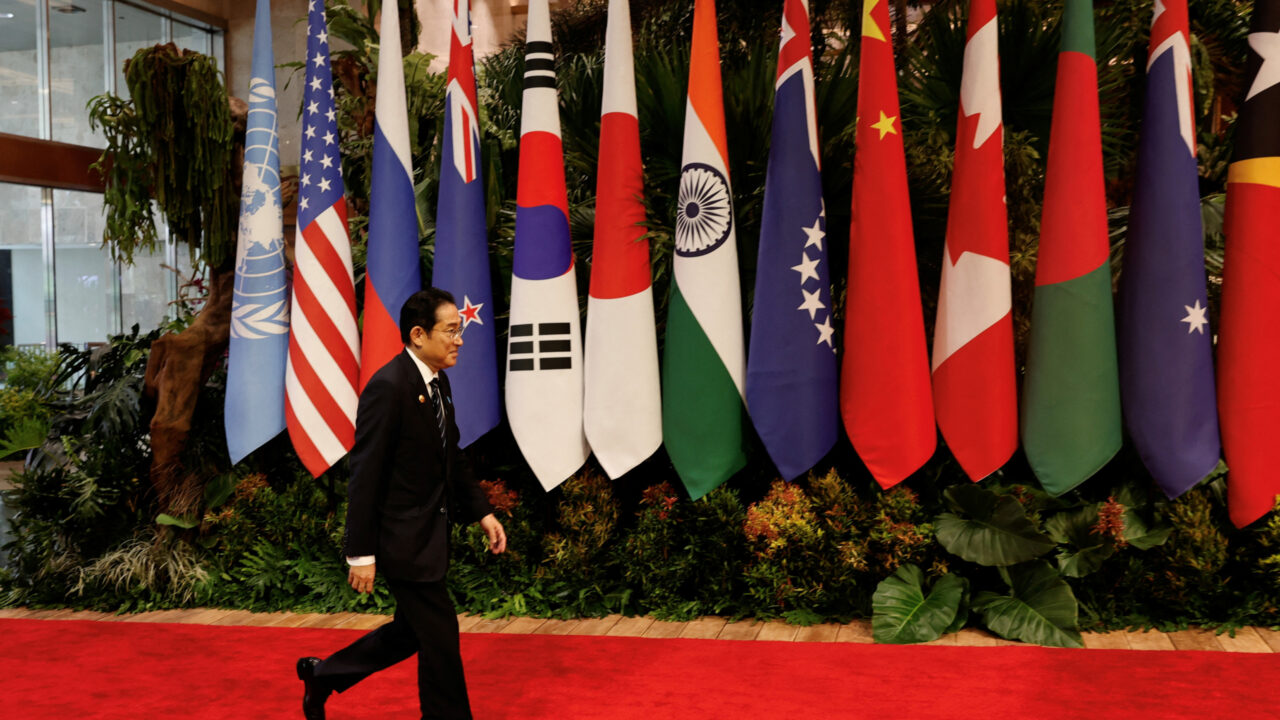What Europe can learn from Japan’s approach to the global south
Russia’s war on Ukraine, the US-China rivalry, and evolving geostrategic dynamics in the Indo-Pacific region have pushed Japan to recalibrate its approach to emerging countries in the global south. European governments, facing challenges to restore a positive image in their engagement with these countries, can draw valuable inspiration from Tokyo’s approach
Russia’s war on Ukraine has reshaped the geopolitical landscape and exposed a disconnect between the West and the global south. While G7 countries swiftly endorsed sanctions against Russia, many nations in southeast Asia, Africa, and Latin America opted for more neutral positions, and refrained from aligning with Western narratives on the war. This divergence has sparked a crucial debate about the geostrategic significance, motivations, and positions of emerging global south countries and the relationships between them and G7 nations. In the context of Russia’s aggression and the West’s strategic rivalry with China, as well as the growing influence of both Moscow and Beijing throughout the global south, Western leaders are attempting to strengthen relations with emerging countries and encourage them to distance themselves from Russia and China.
Japan, the sole Asian G7 member, has succeeded in building stable and trusted relations with southeast Asian and African countries, particularly under prime minister Fumio Kishida’s leadership. In January, Kishida announced his plans to work more closely with the global south as a response to the evolving global power dynamics and the need to share global governance responsibilities. Like its Western G7 counterparts, Japan wants to foster a free and open international order that ensures global peace. And it hopes to garner support for this vision from countries in the global south and prevent them from aligning with authoritarian regimes, such as Russia. This is especially significant for Japan in the context of China’s growing role in its geostrategic landscape.
Japan’s outreach to countries in the global south has so far been positively received. In a survey of policymakers from southeast Asian countries, for example, Japan has consistently ranked as the region’s most trusted power since 2019. Japan’s development assistance has stirred minimal controversy across the region and is generally perceived as non-threatening. A separate study of five southeast Asian countries – Cambodia, Indonesia, the Philippines, Vietnam, and Thailand – found that Japan enjoys a positive image, ranking above the United States, Australia, India, Germany, and the European Union in terms of its soft power.
Meanwhile, despite Europe’s deep and all-encompassing relations with southeast Asia and Africa, and European leaders’ best efforts to re-engage with these regions, many are wary of European engagement. Europe’s colonial legacy still affects attitudes, as do perceived double standards in terms of trade and human rights. Many in the global south consider European efforts to be self-serving and post-colonial. There is a broad perception among policymakers that the EU does not take into account their main demands – including representation in international organisations, such as the G20, speeding up the implementation of the United Nations Sustainable Development Goals, or addressing global inequalities by cancelling debts or ensuring equitable access to vaccines – and does not see emerging countries as equal partners. There is a crisis in Europe’s engagement with the global south and a strong need for a new approach.
Japan has the advantage of decades of experience cooperating with such partners, particularly in southeast Asia, and does not have the same colonial baggage that Europe has, particularly in Africa. But Tokyo has also recognised that it needs to adjust its engagement strategy to be a more attractive partner and fit these countries’ current needs. European governments, facing challenges to restore a positive image and formulate effective strategies for engaging with countries in the global south, may take valuable inspiration from Japan’s evolving approach and work together with Tokyo as a strategic partner to develop a more attractive cooperation offer for these countries.
Japanese strategic thinking
Japan’s new strategic outreach is grounded in engaging and inclusive narratives. Kishida described the central tenets of Japan’s approach during a visit to India in May 2023. He stated that the goal of Japan’s foreign policy was “leading the international community in the direction of cooperation rather than division and confrontation”, and highlighted the importance of dialogue that “respects the historical and cultural diversity of each country” and strives for “equal partnership” among nations. Japan’s invitation of eight global south countries to the G7 summit in Hiroshima that same week, coupled with the summit’s inclusive agenda, underscored this intent.
Tokyo has made clear steps towards implementing its new strategic outreach.
Showing up
Tokyo’s approach is characterised by a long-term commitment to partner countries. Japan actively engages with leaders from the global south through frequent visits, dialogues, and regional forums, including the G20. Tokyo cooperates with ASEAN, for example, through the ASEAN-Japan Summit and the ASEAN-Indo-Pacific Forum. These meetings have led to concrete progress: in September, a joint statement to establish the ASEAN-Japan Comprehensive Strategic Partnership was adopted and Kishida also introduced the Japan-ASEAN Comprehensive Connectivity Initiative. Japan has engaged with African partners on development through the Tokyo International Conference on African Development since 1993, and with the Pacific islands through the Pacific Islands Leaders Meeting since 1997.
While European capitals often rely on EU formats for their engagement with the global south, such as the Asia-Europe Meeting or the EU-Africa Summit Meeting, Japan has also put special emphasis on establishing strong bilateral relationships with key countries. For example, Japan has been enhancing its strategic partnership with India, which Tokyo views as a leading voice for developing nations. Kishida has met regularly with Indian prime minister Narendra Modi over the last two years and this year agreed to further strengthen military and economic relations, adding to an existing robust strategic alliance, arguing that global collaboration is more important than ever in the face of mounting security concerns regarding China. While voices from countries in the global south lament the invisibility of Europeans in their dialogues and discussions, Japan is present in relevant formats and countries, fostering transparent, open, and long-term communication channels, which build critical trust.
Japan is present in relevant formats and countries, fostering transparent, open, and long-term communication channels, which build critical trust
Paying up
Japan is also putting money on the table and using it to implement specific projects. Japan has traditionally supported southeast Asia’s economic growth through official development assistance (ODA), infrastructure development aid, training programmes, and other investments. Japan’s annual net ODA was $15.7 billion in 2021, with five ASEAN countries among the top ten recipients. This year, Tokyo expanded its support and additionally announced a $75 billion new infrastructure and economic assistance programme for countries in the Indo-Pacific and global south and a $30 billion pledge for African nations, to be funded by both the public and private sectors over the next three years, surpassing a previous commitment made in 2019. These pledges include specific initiatives, such as the ASEAN Future Design Action Plan and the ASEAN-Japan Economic Co-creation Vision, which aim to enhance economic resilience, integration, and cooperation in the region, and the Asia-Africa Growth Corridor, a joint initiative to promote connectivity, trade, and development in Africa and Asia. Japan has also overhauled its regulatory toolbox, including revising ODA regulations to allow Japan to proactively propose assistance projects, rather than waiting for recipient countries to request aid. Finally, Japan has committed to invest $33.5 billion of public and private funds in projects that promote industrial cooperation, particularly in manufacturing and supply chains, in India.
Teaming up
Japan has also focused on co-creation, actively engaging local stakeholders in partner countries to find and develop the best solutions for their needs. Besides already existing co-creation projects such as the ASEAN-Japan Co-creation Fast Track Initiative, which supports start-ups in ASEAN countries and Japan to jointly create innovative solutions for social and environmental problems, Japan launched the Japan-Africa Investment Ecosystem Co-Creation Forum and the Africa Impact Investment Fund this year. These projects foster the co-creation of an investment ecosystem between Africa and Japan by providing financing and technical assistance for impact-oriented businesses that address social and environmental issues. An OECD review even commended Japan for ensuring that recipient nations have a sense of ownership over development projects.
*
Japan has adapted its strategy to align its interests and values with those of its partners in the global south, which has earned Tokyo a credible image. European governments can draw valuable lessons from Japan’s approach. They should, like Japan, showcase responsiveness to partners’ changing needs, offering tailored solutions and a long-term commitment. Improved messaging is essential, drawing inspiration from Japan’s inclusive narratives. In order to regain trust, European governments could enhance their presence and influence in the global south by increasing their high-level visits and dialogues with countries of the region and demonstrating responsiveness to partners’ needs. They should also follow Japan’s example of offering more innovative, differentiated projects and services that guarantee co-creation and local ownership. Finally, using the EU’s strong relations with Japan, European countries can engage in joint projects in southeast Asia and Africa, leveraging Japan’s positive image to regain credibility as dedicated cooperation partners. Based on the solid Partnership on Sustainable Connectivity and Quality Infrastructure between Japan and the EU, joint projects to improve connectivity by developing quality infrastructure in the global south would be a good place to start.
The European Council on Foreign Relations does not take collective positions. ECFR publications only represent the views of their individual authors.



